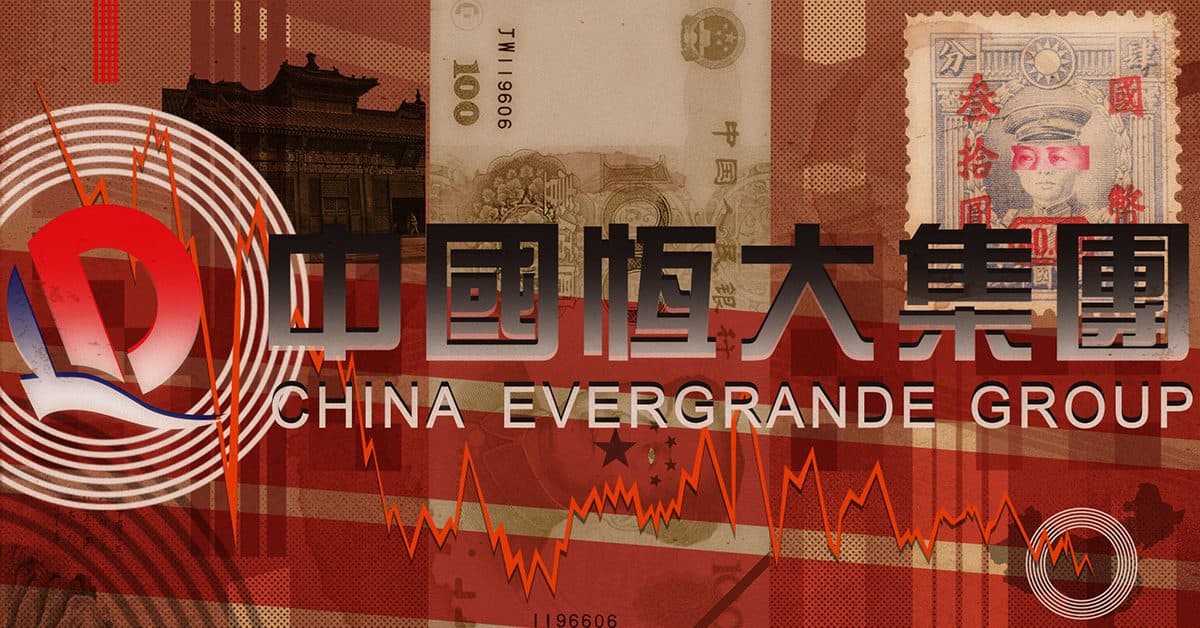Report: Chinese Authorities May Be Preparing for Evergrande’s Collapse
Sources described the government’s actions as a way of “getting ready for the possible storm.”

Blockworks exclusive art by Axel Rangel
- In an effort to curb a potential financial crisis, the People’s Bank of China injected more than $18 billion into its banking system
- The real estate giant has amassed roughly $300 billion worth of debt, the equivalent to 2% of China’s GDP
As Evergrande China Group faces a series of massive bond payment due dates, Chinese authorities reportedly asked local governments to start preparing for the debt-saddled real estate developer’s potential downfall, the Wall Street Journal reported Thursday.
Sources in the journal who are familiar with the matter said Chinese authorities told certain state-owned enterprises and government agencies to step in if Evergrande doesn’t manage its affairs in an orderly manner. Local-level agencies were reportedly instructed to help mitigate Evergrande’s impact on China’s economy.
Sources described the government’s guidance as a way of “getting ready for the possible storm.”
In an effort to limit potential impacts on the broader economy, the People’s Bank of China injected more than $18 billion or 120 billion yuan into its banking system on Wednesday.
The company reached an agreement with bondholders on a bond payment due Thursday north of $84 million, according to a stock exchange filing on Wednesday.
Greg Foss, executive director of strategic initiatives at Validus Power Corp, said it was “very uncertain” whether or not they would bail out offshore bondholders.
“Do they invoke something where offshore bondholders are penalized and they protect local claims, local claims being housing?” Foss told Blockworks. “Out of $300 billion of debt, $200 billion of this is from prepaid housing, [as in] citizens of China that have pre-paid for their house. Does the Chinese government protect those liabilities, versus the bank debt and publicly-traded bond liabilities? I really don’t know.”
‘World’s most indebted real estate developer’
In recent weeks, Evergrande has dominated mainstream headlines. However, the real estate giant has been in financial trouble for much longer, amassing roughly $300 billion worth of debt.
This followed years of unrestrained expansion during which Evergrande’s debt grew alongside its assets and size, not to mention a global pandemic that hit property sales. Its share price has steeply declined this year, and trading of its bonds has repeatedly been disrupted by stock exchanges. (Evergrande shares were down 13.2%, as of press time.)
Once news broke that Hengda Real Estate Group Co Ltd, the parent company of Evergrande, would suspend trading of onshore corporate bonds, markets reacted accordingly. A series of volatile trading days followed as Wall Street and digital asset investors assessed how the company’s travails could impact the global economy.
Cryptocurrency prices declined on Monday as its total market cap plunged 9% on-day, in part due to lingering speculation that Tether was holding securities issued by the embattled developer.
“The scare over Evergrande defaulting on their bonds roiled the markets earlier this week as well as crypto markets, especially with the speculation that Tether may be holding Evergrande’s commercial paper,” said Kevin Kang, founding principal of BKCoin Capital. “However, Tether announced that they did not have any exposure to Evergrande, but that wasn’t enough to stop the risk-off sentiment across the markets.”
Cryptos regain footing
Since Monday’s broad sell-off, major cryptos have slowly regained footing. Bitcoin and ethereum have made modest gains, advancing 3% and 4% in the afternoon.
“Evergrande seems to be supported by mainland China’s banks for the time being, assuaging much of the market’s concerns about triggering a 2008 Lehman’s Brother-style effect on the global markets,” said Edward Deleon, CEO of Anatha. “That said, the strategy of ‘big-budget bailouts or bust’ the world’s leading economies continually find themselves forced to deploy is literally the reason BTC was invented. This should prove net positive for the entire crypto market on the macro scale.”
Are you a UK or EU reader that can’t get enough investor-focused content on digital assets?Join us in London on November 15th and 16th for the Digital Asset Summit (DAS) London. Use code ARTICLE for £75 off your ticket. Buy it now.






